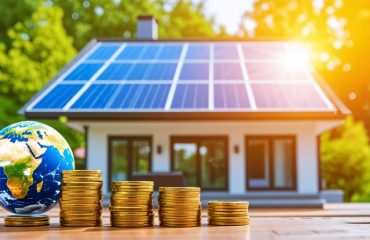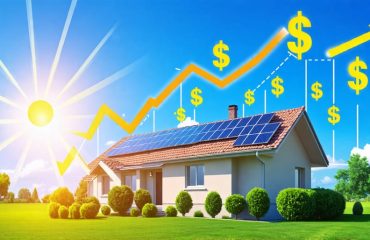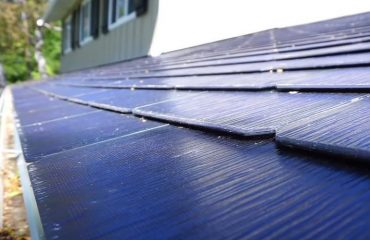Embrace solar panels to slash energy bills and reduce your carbon footprint. Maximize savings by taking advantage of government incentives and tax breaks aimed at encouraging solar adoption. Explore high-efficiency solar technologies, such as bifacial panels, that harness more sunlight with fewer resources. Overcome common misconceptions, like the need for constant sunshine, as today’s panels work efficiently even on cloudy days.
Breakthroughs in Photovoltaic Technology

Improved Solar Cell Efficiency
Recent advancements in solar energy are revolutionizing how effectively sunlight is converted into electricity. By harnessing cutting-edge materials like perovskites and new cell designs, solar panels are achieving unprecedented efficiency rates. Unlike traditional silicon panels, these innovative materials can capture more sunlight and convert it into power, meaning you get more energy using the same or even a smaller footprint on your roof. This translates into tangible savings on your energy bills, making solar a more enticing option for homeowners seeking to reduce monthly costs while going green.
One of the most exciting developments is the tandem solar cell, which layers different materials to absorb more light and maximize electricity output. As solar efficiency climbs, the return on investment becomes even more attractive, expediting the payback period. These improvements debunk the myth that solar power isn’t efficient enough in cloudy conditions or northern climates. Embracing these innovations supports a sustainable lifestyle, lowers costs, and contributes positively to the environment.
Cost Reductions in Manufacturing
Advancements in solar energy have significantly reduced solar panel costs, making sustainable living more accessible for homeowners. Innovative production techniques, such as automation and the use of advanced materials, have streamlined manufacturing processes, allowing for higher efficiency and lower expenses. These technological improvements mean that producing solar panels is not only faster but also more cost-effective. By reducing waste and optimizing energy output, manufacturers can pass savings on to consumers. This translates into lower upfront investment for homeowners looking to switch to solar power, making it an attractive option for cutting energy bills. Additionally, as solar technology continues to evolve, these cost reductions are expected to persist, further benefiting those eager to embrace a more environmentally-friendly lifestyle without breaking the bank. Adopting solar energy today not only supports sustainability but also paves the way for long-term financial savings.
Energy Storage and Backup Solutions
Battery Technology Innovations
Recent strides in battery technology have significantly improved the way homeowners utilize solar energy, making it more practical and efficient than ever. Modern batteries now offer increased storage capacities, allowing users to store more energy during sunny days and use it when needed, such as during cloudy periods or at night. This advancement means that you can rely on your solar panel setup for a larger portion of your energy needs, bringing down your electricity bills considerably. Moreover, improved lifespans of these batteries mean fewer replacements and less waste, adding to the environmental benefits.
One of the remarkable innovations is the development of lithium iron phosphate (LiFePO4) batteries. They are not only more stable than their predecessors but also have a longer lifespan and better capacity retention over time. As you look to invest in solar energy, considering a solar panel backup can maximize your home’s energy efficiency, ensure a steady power supply, and ultimately enhance your energy savings. By debunking the myth that solar energy is unreliable due to intermittency, these advanced battery systems empower homeowners to embrace solar technology with confidence, knowing they are making a long-lasting and lucrative investment.
Integration with Smart Home Systems
The integration of solar and storage solutions with smart home systems represents a significant leap forward in energy management for homeowners. By synchronizing solar panels and battery storage with smart home technology, individuals can optimize their energy use based on peak production and consumption times. This not only contributes to a more sustainable lifestyle but also leads to cost savings by reducing reliance on grid electricity during peak hours when rates are higher. Imagine receiving real-time alerts through your smartphone that guide you on when it’s best to use stored solar energy or when to sell excess power back to the grid. This intelligent management system automatically adjusts to weather conditions and energy usage patterns, making it an effortless experience for users. Furthermore, these advancements demystify the complexities of solar energy, allowing homeowners to see immediate results in energy savings and taking proactive steps towards a more sustainable future. Integrating these technologies offers both environmental benefits and tangible reductions in household energy bills, aligning perfectly with the goals of eco-conscious and budget-minded individuals.

Personal Financial Benefits of Modern Solar Solutions
Government Incentives and Rebates
Transitioning to solar energy is more affordable than ever, thanks to a variety of government incentives and rebates. Federal and state programs offer significant financial support, making solar panels a worthy investment for homeowners. For example, the federal solar tax credit allows you to deduct a portion of your solar energy costs from your taxes, saving you thousands. Additionally, many states offer specific rebates and performance-based incentives tailored to enhance your financial benefits further. It’s worth exploring solar energy grants that could unlock massive savings for your home. These financial aids not only reduce upfront costs but also accelerate the return on investment. Emphasizing sustainability, these incentives not only benefit your wallet — they also contribute positively to the environment by encouraging clean energy usage. By taking advantage of these programs, you can enjoy lower energy bills and contribute to a greener future, making the shift to solar energy a smart and responsible choice.
Energy Bill Savings and ROI
Homeowners considering solar panels often wonder about the financial benefits. Calculating the return on investment (ROI) and long-term savings can offer a clearer picture. Start by determining the total cost of your solar installation, including equipment and labor. Next, consider any available incentives or tax rebates, which can significantly reduce initial expenses. Conversion efficiency improvements mean today’s solar panels can produce more electricity, increasing your savings. Estimate your yearly energy bill reduction by analyzing past electricity use; the more you save, the faster you recover your investment. Typical payback periods range between 5 to 10 years, depending on location and energy costs. After this period, enjoy free electricity for the lifespan of your panels, often 25 years or more. Beyond financial savings, switching to solar power helps the environment by reducing reliance on fossil fuels and lowering your carbon footprint—excellent motivation for embracing sustainable living.

Debunking Common Solar Energy Myths
Myth: Solar Energy Isn’t Reliable
Solar energy has long been viewed with skepticism regarding its reliability, but advancements in technology are rapidly changing that perception. Modern solar panels are far more efficient, capable of harnessing energy even on cloudy days, ensuring a more consistent energy supply. Furthermore, innovative storage solutions, like home battery systems, provide a way to store excess energy for use during nighttime or unfavorable weather conditions. This means homeowners can maintain a stable energy source regardless of the time of day. Embracing these advancements not only dispels myths about the reliability of solar but also leads to greater energy independence and reduced electricity bills. By investing in these technologies, individuals contribute to a sustainable future while enjoying personal financial benefits.
Myth: Solar Panels Aren’t Environmentally Friendly
Contrary to the myth, solar panels are indeed environmentally friendly throughout their lifecycle, especially when compared to fossil fuels. The production of solar panels does involve some resource use and emissions, but these impacts are significantly offset over their long operational life. Once installed, solar panels generate clean energy for decades, reducing reliance on non-renewable energy sources and cutting down on harmful emissions. In fact, the energy payback time for solar panels—how long it takes to generate the energy used in their manufacture—has improved dramatically. Today’s advancements make panels more efficient, further minimizing their environmental footprint. For homeowners, this translates into not only a step towards sustainability but also tangible savings on utility bills. Opting for solar power supports both your wallet and the planet, showcasing how clean technology can drive positive change.
Conclusion
In conclusion, embracing advanced solar technologies offers substantial benefits that are hard to overlook. Homeowners who choose to integrate these systems can significantly reduce their energy bills while contributing positively to the environment. The innovative features and improved efficiencies of modern solar solutions prove that shifting towards sustainable energy is not only viable but also highly rewarding. By harnessing the sun’s power, individuals can lower their carbon footprint, support environmental health, and gain financial advantages through reduced utility costs and potential tax incentives. Moreover, widespread adoption of these technologies helps debunk myths about solar energy’s reliability and affordability, encouraging more people to make the transition. As these technologies continue to evolve, they become more accessible and user-friendly, paving the way for a brighter, cleaner future. Embracing solar technology is more than just an investment in a home—it’s an investment in a sustainable planet and a financially secure lifestyle.









